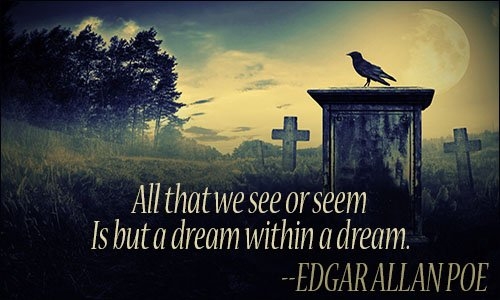Het arrangement Edgar Allan Poe is gemaakt met Wikiwijs van Kennisnet. Wikiwijs is hét onderwijsplatform waar je leermiddelen zoekt, maakt en deelt.
- Auteur
- Laatst gewijzigd
- 11-06-2020 11:26:19
- Licentie
-
Dit lesmateriaal is gepubliceerd onder de Creative Commons Naamsvermelding 4.0 Internationale licentie. Dit houdt in dat je onder de voorwaarde van naamsvermelding vrij bent om:
- het werk te delen - te kopiëren, te verspreiden en door te geven via elk medium of bestandsformaat
- het werk te bewerken - te remixen, te veranderen en afgeleide werken te maken
- voor alle doeleinden, inclusief commerciële doeleinden.
Meer informatie over de CC Naamsvermelding 4.0 Internationale licentie.
Aanvullende informatie over dit lesmateriaal
Van dit lesmateriaal is de volgende aanvullende informatie beschikbaar:
- Eindgebruiker
- leerling/student
- Moeilijkheidsgraad
- gemiddeld
- Studiebelasting
- 4 uur 0 minuten
Bronnen
| Bron | Type |
|---|---|
|
Draw my life https://www.youtube.com/watch?v=SuaHMpAtO6A |
Video |
| Video | |
|
http://interactive-img.com/view?id=15545 http://interactive-img.com/view?id=15545 |
Link |
|
America in the 1800s https://www.sutori.com/story/america--NDQ8qbCpWcEtuhEK9Ao1TMQL |
Link |
|
Themes https://www.youtube.com/watch?v=xqkdsY9SG5o |
Video |
|
https://forms.office.com/Pages/ResponsePage.aspx?id=AvgTku57zU6Le0QxCxVsqiaI9Hch5JVEgXMqqbC8NcpUOVhZRDAxSkpYMjgzUjdYVDlOVVE1TEZCWS4u https://forms.office.com/Pages/ResponsePage.aspx?id=AvgTku57zU6Le0QxCxVsqiaI9Hch5JVEgXMqqbC8NcpUOVhZRDAxSkpYMjgzUjdYVDlOVVE1TEZCWS4u |
Link |




